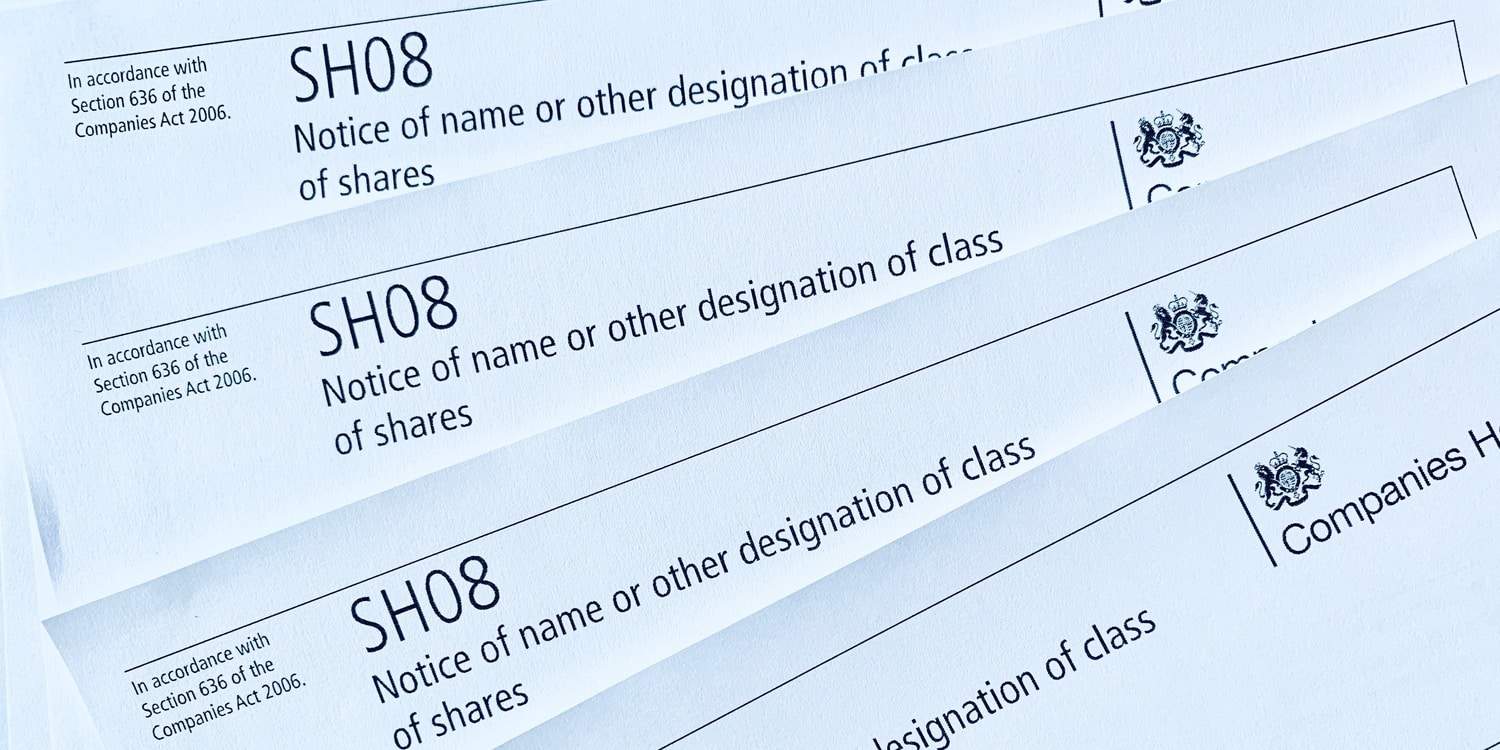Companies may sometimes carry out a redesignation of shares, which involves converting existing shares from one class to another.
This may be required for a variety of reasons, including maintaining control of the company, providing people with the benefit of dividends without relinquishing control, tax planning purposes, bringing investors in, issuing employee shares, or estate planning.
Although the redesignation of shares often involves alphabet shares, it also applies to other classes of shares. We will explore some of the issues surrounding this process below.
Key takeaways
- Redesignating shares can optimize tax planning by allowing different dividend rates for different shareholders.
- Non-voting shares incentivize employees with dividends while preserving control for existing shareholders.
- Companies must update their articles of association to issue multiple classes of shares effectively.
What are the typical rights associated with ordinary shares?
Ordinary shares are the most common type. Companies can create different ordinary share types – known as ‘alphabet shares’ (e.g., named A, B, and C, etc). Each type of ordinary share will have its own rights and it is up to the company to decide how many types are created.
Ordinary shares cover the basic rights associated with voting, dividends, and return of capital in the event of a winding-up. Alphabet shares are usually introduced to provide deviations to these rights, e.g., variable dividends.
It is also common for different types of shares to be distributed to employees within an organisation. A breakdown of different shares and their rights is as follows:
Ordinary Shares
As the most popular type of share, ordinary shares carry one vote (per share). The owners of the company are permitted to participate equally in the company’s dividends. In the event of the company winding up, any proceeds are allocated equally between shareholders.
Ordinary shares can be broken down into different classes, providing basic variations on their rights, and these are often denoted by a different letter of the alphabet (often known as alphabet shares).
Non-Voting Shares
Non-voting shares are commonly issued to employees to allow remuneration to be paid as dividends – usually for tax efficiency. Non-voting shares will generally mean the holders have ordinary shares with no rights to vote or attend the general meetings within the company.
A benefit of having non-voting shares is to provide staff with the prospect of receiving company dividends, which is often used as an incentive for the recruitment of new staff.
Another common reason is to allow the shareholders’ children to financially benefit from the company, without relinquishing any control to them.
Preference Shares
Preference shares differ because they have a fixed or variable rate of dividend which is paid out before the other share classes – meaning they take precedence over ordinary share dividends. The remaining sums available for distribution are shared between the holders of ordinary shares after the preference shareholders have been paid.
A purpose of a preference share is comparable to making a loan – an investor wanting to introduce a fixed return can do so by designating fixed rate shares. The preference share dividend will normally be valued as a percentage of what the share was valued at when issued.
Redeemable Shares
Redeemable shares are usually issued with no voting rights. If they are issued to an employee and the employee leaves the company, the shares can be bought back by the company, and at the nominal value of which they were at the time of issue.
The two main reasons for having redeemable shares are (i) to be used as an exit strategy, and (ii) as a way to buy out certain shareholders.
Redeemable shares can be redeemed at the instigation of either the shareholders or the company directors or both (depending on what the articles say).
In summary, the reasons for having multiple classes of shares include:
- to have control over voting rights
- to have the entitlement to buy back certain shares in the future
- as a way of being more tax efficient – dividends can be paid at various rates to the respective holders of the different shares
Why you would redesignate your shares?
There may be a time when you recognise your company is somehow being hindered by your share structure. The reasons for carrying out a redesignation of shares might be:
- an opportunity to change the way in which decisions and finances are managed
- to alter any voting rights among employees
- or for dividend and capital distribution.
By deciding to carry out a redesignation of shares, it may be possible to:
- maintain control of the company
- provide staff with the benefit of dividends (without relinquishing control)
- improve tax planning
- attract new investors
- issue shares to employees (which is often recognised as an incentive to join a company)
- or even to enhance estate planning (e.g., offer security for your children etc.).
One of the key reasons for a redesignation of shares relates to tax planning. The freedom of declaring different rates of dividends to different shareholders can be financially beneficial. For example, if one shareholder is an employee who pays income tax whereas another shareholder does not work, applying different dividends to each of them can optimise personal tax allowances, etc.
Although there are many valid motives for the redesignation of shares, it is advisable to ensure that you are creating a new structure that makes sense.
If creating various share types with different entitlements has the result of over-complicating matters, you risk progress being stalled in other areas: managing general meetings can become harder and raising new capital from investors could become more tricky.
Conditions needed to allow for multiple classes of shares
Before a company can allot additional classes of shares, it needs to have the required authorities in place.
In the first instance, the company’s articles of association should specify the classes of shares that the directors can allot, the rights these shares have, and how the share rights can be changed in the future.
If the company’s articles do not specify this, then it will have to adopt a new set of articles that do. The process for doing this is to pass a special resolution (which requires 75% of the company’s shareholders to agree) to adopt the new set of articles.
It will also be necessary to tell Companies House of how the share classes will now vary in their rights (known as the ‘particulars’), with the filing of the form SH10 (Give notice of particulars of variation of rights attached to shares).
Furthermore, the directors themselves will also need to be expressly permitted to issue multiple classes of shares. If the articles of association do not already provide this permission, then the shareholders of the company need to pass a further ordinary resolution (which requires greater than 50% of the shareholders to agree).
The process of redesignating shares
The process of redesignating shares is distinct from the creation of new classes (which we described in the section above). It concerns only the procedural side of converting shares from one class to another. To redesignate shares, the members of the company must pass an ordinary resolution with the following details:
- The name of the shareholder and the number of shares to be redesignated
- The class of shares they originally belong to
- The class of shares they are being redesignated into
Once the resolution has been approved, the company is required to submit the form SH08 (Notice of name or other designation of class of shares) to Companies House to notify them of the redesignated shares.
At this point, new share certificates should be issued to the relevant shareholders, demonstrating the change of share class.
Key points
- Identify motivations for re-classifying your existing company shares
- Ensure company directors obtain authority from the shareholders before reclassifying shares
- Check the articles of association and any shareholders’ agreement for any restrictions related to issuing new classes of shares
- Take into consideration the statutory right of pre-emption that existing shareholders may have
- Subject to any pre-emption rights, existing shareholders can transfer their new shares to third parties (e.g., children/spouses, etc.)
Further details about the requirements of amending your share structure can be found on the GOV.UK website – making changes to your limited company’s share structure.
How we can help you redesignate your company shares
If you are thinking about redesignating your shares, our secretarial team can help you every step of the way. Our Redesignation of Shares Service provides you with guidance, together with the processing and completion of all supporting documentation you need to convert your shares.
If you would like to know more about this service, contact the team today on 0203 984 5389, or email us at [email protected].














Join The Discussion
Comments (10)
I require recalisifcation of ordinary shares and new articles of association for my company
Thank you for your kind comment, Varsha.
Please contact our Company Secretarial Team on 020 3894 5389 for assistance with this matter.
Kind regards,
The QCF Team
Hello! Can a company convert the already issued ordinary shares to redeemable preference shares?
Thank you
Thank you for your kind enquiry.
Unfortunately, it is not possible to convert (or “re-designate”) ordinary shares into redeemable preference shares. Whilst it is generally possible to convert ordinary shares into preference shares, you can’t add the redemption rights as shares that are to be redeemable shares must be given this right when they are first issued.
Kind regards,
The QCF Team
Good Morning Graeme, thank you for that.
Is there a limit on the amount I can offer ? .
Thanks
Thank you for your follow up enquiry, Rodwell.
I can confirm there is no limit on the amount of redeemable shares, or their value, that you can offer.
I trust this information is of use to you.
Regards,
Nicholas
Hello, I am thinking about setting up a ltd with common stock and redeemable shares (maybe preferred shares). Can I offer the redeemable shares at a much higher price,than the common stock .
Thank you
Thank you for your kind enquiry, Rodwell.
In general terms, the redeemable shares can be set at a higher price per share than the other shares in the limited company.
You should ensure the articles of association allow redeemable shares to be issued.
I trust this information is of use to you. If you have any further questions on this topic, please do not hesitate to leave another message.
Regards,
Nicholas
Thank you Graeme, if I have dividends shares that mature in a given time frame (5years) what happens to any unpaid shares at the end of the 5 years .
Thank you
Thank you for your enquiry, Rodwell.
In general terms, whether shares are paid or unpaid is important when a company is dissolved or wound-up. This is because the nominal value of the shares to be paid is the liability of the shareholder who owns them.
In your scenario, there does not seem to be a link to unpaid shares and what happens to the dividend shares that mature in a given time frame. Shares still exist in reality and are effective, even if they are unpaid.
I trust this information is of use to you.
Regards,
Nicholas